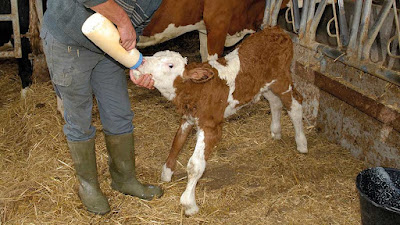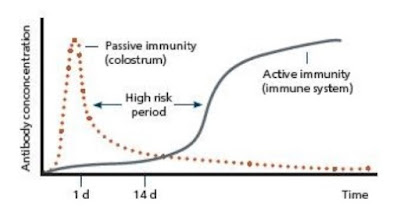Importance of colostrum feeding to beef calves
Colostrum, the cow’s first milk, is critical to the health of the newborn calf and has a significant impact on their future performance. Calves are born lacking disease protection because antibodies (immunoglobulins) do not pass across the dam’s placenta to the fetal circulatory system.
 |
| Why is colostrum important for beef calves? |
The critical immunoglobulins found in colostrum create passive immunity, providing calves with initial protection against environmental pathogens and disease. Colostrum is also high in protein, fat and essential vitamins and helps calves begin to build a healthy immune system.
 |
| colostrum affecting immunity |
The benefits of feeding beef calves quality colostrum include:
- Increased profitability at weaning
- Improved lifetime performance
- Decreased illness and treatments
Causes of poor colostrum quality
Although colostrum significantly impacts the health of calves, the quality and quantity of this vital nutrient is entirely dependent on the dam and on farm management practices. Colostrum quality and quantity may be negatively impacted by:
The cow’s age: First-calf heifers generally produce less colostrum that is also typically lower in quality when compared to more mature cows.
High stress: Stressed cows can leak colostrum prior to and/or during parturition, which decreases colostrum quantity.
Poor calving environments: Not having enough space or nutrients or an overly busy environment (e.g., too many other cows or staff coming in/out) can also contribute to lower colostrum quality.
Improper storage: When extra colostrum is available from a cow, save it, but be sure to chill or freeze it immediately to ensure that the maximum quality is preserved. Refrigerated colostrum should be stored no longer than two to three days before being fed in order to avoid potential contamination by harmful bacteria.
Inadequate nutrition: Appropriate protein levels are critical to colostrum quality and quantity. Feed additives have been proven to boost colostrum quality and quantity in peer-reviewed research.
Cleanliness: Clean, high-quality colostrum can quickly become contaminated by bacteria and pathogens if handled improperly. Ensure that colostrum is properly collected from a clean udder, stored in a sanitized bucket or bottle, and fed in a clean, sanitized bottle or esophageal tube feeder.
